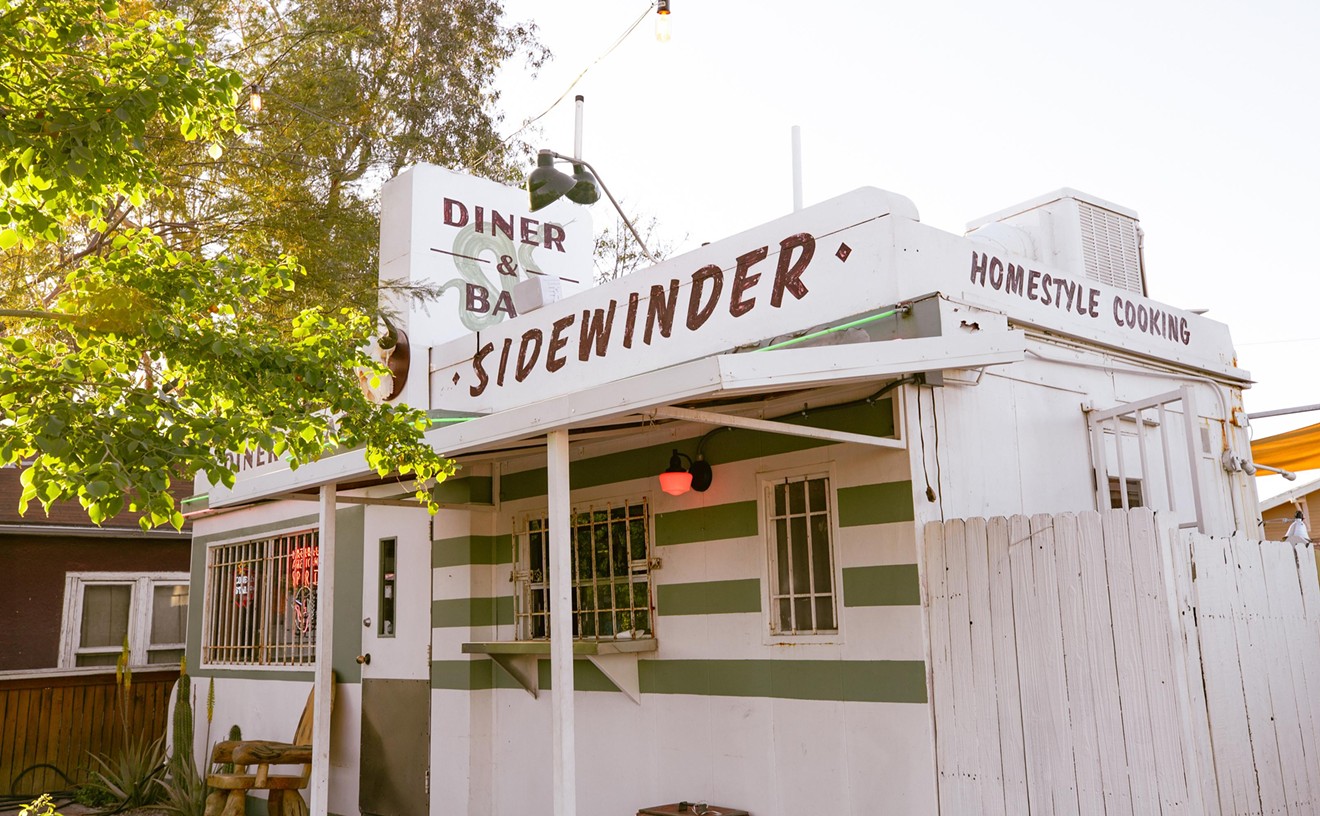On a small table in the corner of his living room sits a lunch pail with gold flowers painted on it, along with the words "If Lucy Fell," the name of Schaeffer's best-known movie to date — a 1996 romantic comedy starring Sarah Jessica Parker that took in $2.4 million at the box office (and cost $3.5 million to make). Under normal circumstances, a flop like that could torpedo a director's career, but Schaeffer considers the movie's lunch pail something of an oracle, and thinks nothing of asking it direct questions about his future.
"Do we have enough money to make the next movie?" Schaeffer asked the pail, before leaving for work.
"How much do you want? How much do you want?" replied the lunch pail in a gruff tone as Schaeffer opened and shut its top to make it appear as though it were talking to him.
"Well," Schaeffer said. "We need $500,000."
"Let me check," said the lunch pail, pausing for dramatic effect. "Okay," the pail finally replied.
Of course it did. Schaeffer — like most independent filmmakers — depends on the kindness of strangers to continue his directing career, particularly because he has an unbroken string of box-office failures to his name. And it's his strange brew of bravado and self-absorption that has kept Schaeffer in the game ever since his breakout indie, My Life's in Turnaround, set his career in motion in 1993 with rave reviews.
What has followed for Schaeffer — a steady 13-year career as the director of six movies, none of which has made a cent — defies the standard blueprint for indie directors, who must bank on their box-office record to attract investors every time they venture back into the movie marketplace. And yet time and time again, Schaeffer, a money-loser, jumps back in. John Sloss, a prominent New York-based entertainment lawyer who has executive-produced numerous indie hits, including Napoleon Dynamite and Before Sunset, says that, more often than not, filmmakers never go on to make a second film, simply because of the emotional and logistical obstacles to getting funding. "A lot of people get discouraged," Sloss says. "And that's not something I think Eric Schaeffer knows the meaning of. He's a persevering sort."
That's one way to put it. Shot on a budget of $40,000 in 15 days (with $160,000 in post-production costs), My Life's in Turnaround, a movie about two clueless slackers trying to make a movie, shared the early '90s spotlight with such star-making success stories as Metropolitan, Clerks, Reservoir Dogs, and The Brothers McMullen. New York Times critic Janet Maslin called the film, which Schaeffer co-directed and co-wrote with his friend Donal "Donny" Ward, "scrappy low-budget comedy with lots of insouciant charm," and — voilà! — like Quentin Tarantino and Kevin Smith, Schaeffer moved up in the world, signing on as a client of Creative Artists Agency and making a deal to direct If Lucy Fell for $3.5 million at TriStar.
But with the release of If Lucy Fell in 1996, the difference between Schaeffer and his indie counterparts became painfully apparent — and the self-confidence that launched his career now threatened to derail it. Critics tore Schaeffer apart for casting supermodel Elle Macpherson as his love interest whom he makes out with and then dumps, leaving her standing alone in her apartment in her underwear. Sarah Jessica Parker, whose character plans to jump off the Brooklyn Bridge with Schaeffer if they can't find true love by her 30th birthday, told the New York Times by way of summing up the experience: "Perhaps it would have been best if Lucy had fallen."
"So, I'm sitting at home and I'll be like, Okay, what are my choices? Try to get big stars in my movie, but that takes a long time, which always seems frustrating to me. Or I can make a movie. So I'll write a movie. It will take a month to do a script. Then I have to get the money. I go backwards. I set a start date to make the movie knowing that I'll make it by any means necessary. No matter how much money I have. So when people say, how much money do you need or what's your budget? I'll say, No, it's the opposite. However much money I'll get is how much I'll make the movie for."
Schaeffer is explaining how he gets a movie made today — a decade after If Lucy Fell and in the wake of four other low-budget box-office failures, most dealing with men in the image of Schaeffer and the women who date them. In 1997, he starred opposite the model Amanda de Cadenet in his third film, Fall, about a cabdriver who picks up a millionaire supermodel, takes her back to his place, and gives her an orgasm in mere seconds. He made the movie with $500,000 of Intel stock, and it grossed $51,000 at the box office. In 2000, he released Wirey Spindell, starring himself as basically himself. It made $9,838. Never Again, starring Jill Clayburgh and Jeffrey Tambor, faired better, grossing $307,631; and his most recent movie, 2004's Mind the Gap starring Schaeffer as a really fun dad, brought in $9,496. (Then there's that other medium, TV. Most recently Schaeffer created a failed television series, Starved, a comedy about eating disorders, which FX quickly canceled but at least helped our writer-director pay off his debt from Mind the Gap.)
Nothing in that dubious résumé can explain Schaeffer's relentless belief that he's on the verge of huge success. And yet he's reluctant to find outside backers for his next project because "I would hate to have this one be the one that gets sold for $3.5 million at Sundance, when we finally took someone else's half a million bucks."
On the Saturday night after Thanksgiving, Schaeffer met his old pal Donny Ward to discuss their new film over Indian food in the East Village.
Returning to the last time things were good, Schaeffer and Ward are making the "unofficial sequel" to My Life's in Turnaround titled They're Out of the Business (unofficial because neither owns the rights to Turnaround). The duo plans to cobble together $300,000 of seed money with credit cards, loans, and friends. The story follows two guys in their 40s who once had a hit TV show, and are getting back together to make another show and re-create their glory days.
After talking over their plans, dinner conversation turned to the more mundane matter of traffic — a subject close to Schaeffer's heart, owing to the amount of time he spends commuting from New York City to a farmhouse he owns in Vermont.
"My philosophy is that I'd rather be going a hundred miles an hour in the wrong direction than sitting in traffic in the right direction," Schaeffer said, describing how he was recently stuck in standstill traffic near Hartford, Connecticut, and found an alternative route that took him 80 miles out of the way in order to leap over the 15 miles of traffic. "So, Donny, if you were told it would be the same hour and a half to get through that 10 miles, would you do the drive or would you stay there?"
"I would just find something to do in Hartford. I'd wait for it to all go away."
"But what if you had to do those two choices?"
"I think I would just go somewhere else."
"No, you don't have that as a choice. These are the two choices. You could drive . . ."
"But that's my choice," Ward cut in. "I've decided that. That's my choice."
"Well, in this game we're playing now, that's not a choice."
"I quit the game. Just like I quit the highway. I would quit the road. I quit the game."
Schaeffer shook his head with supreme annoyance and returned to his food. For him, quitting just isn't an option.










